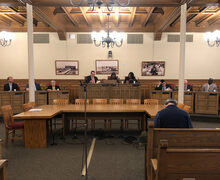SU hosts John Inazu for Hendricks Chapel Interfaith Exploration Week
Ella Chan | Asst. Photo Editor
Inazu is the author of “Learning to Disagree: The Surprising Path to Navigating Differences with Empathy and Respect,” published in 2024.
Get the latest Syracuse news delivered right to your inbox.
Subscribe to our newsletter here.
John Inazu, a professor of law and religion at Washington University in St. Louis, spoke at Syracuse University’s Hendricks Chapel as part of the Interfaith Exploration Week series on Wednesday evening. He advocated for conflict negotiation among people holding different values and beliefs.
Throughout his discussion, Inazu highlighted his approach to finding common ground with people with differing viewpoints than him. He said he approaches people with humility, tolerance and patience. The professor presented as national debate swirls around President Donald Trump’s efforts to end alleged censorship of free speech.
“The goal is to persuade and help the opposing side to see things differently,” Inazu said. “If you really think someone is evil, or the beliefs that they hold are evil, the result ends with minimizing their influence, instead of changing their thoughts.”
He explained that modeling these values is essential for fostering democratic citizenship, as it enables individuals to engage with others who may have different perspectives in a charitable and respectful manner.
The event was co-hosted by Hendricks Chapel, the Maxwell School of Public Affairs and Citizenship and SU’s Christian Staff and Faculty Association.
Throughout the lecture, Inazu emphasized his viewpoint that disagreements should be approached with patience and tolerance. Inazu is the author of “Learning to Disagree: The Surprising Path to Navigating Differences with Empathy and Respect,” published in 2024.
He said his motivation for writing his book stemmed from a hope to bridge his experiences as a professor with his mission of integrating faith into the academic side of his life.
He said his book emphasizes faith, democracy and conflict — topics he also highlighted throughout his lecture. Discussing the challenges of disagreement, he said society often views opposing sides as evil rather than simply acknowledging a difference in opinion.
People are often scared to share their opinions due to the fear of being ostracized, Inazu said. As a professor leading classroom discussions, he regularly watches students experience this. Similar self-censorship has been a topic of debate, both in the White House and on college campuses across the country.
“We are sorting ourselves more homogeneously than ever, trying to shop at the right stores and avoiding the wrong stores because we do not want to get labeled as evil,” Inazu said.

Ella Chan | Asst. Photo Editor
Inazu said he tries to find common ground with people with differing viewpoints than him through humility, tolerance and patience.
When he’s not teaching at WashU, Inazu leads the Carver Project and the Legal Vocation Fellowship, both of which he founded. He’s also the Senior Fellow at Interfaith America and the Trinity Forum.
Brian Konkol, vice president and dean of Hendricks Chapel, said after reading the book, he has a better understanding of his own and others’ points of view. Konkol, who helped moderate Wednesday’s discussion, said gatherings like this remind him why he loves working on a college campus.
“This is a place where you can deepen your roots and expand your reach,” Konkol said.“And you can learn more about what you believe to be true and have those beliefs challenged and that’s what’s the joy of being at a great university like SU.”
Inazu’s book also explores interfaith collaboration, which he touched on during his lecture, emphasizing that people don’t need to have similar theological beliefs to work together. He said he encourages people to acknowledge that everyone believes in something, saying he thinks of faith as “confidence.”
Johannes Himmelreich, an assistant professor of public administration at Maxwell, expressed how encouraging it is to know that help is available. He also noted these events remind him of how necessary it is to work with “our neighbors” and create a closer connection.
“I feel that many people have a deep desire for connection and a need for having better conversations but need help,” Himmelreich said.
Inazu said his work in conflict spans across differing viewpoints such as anti-abortion advocates and the Black Lives Matter movement; despite their differences, these groups are similar in how much they care about each cause, he said.
Teddy Caputo, a graduate student at the Newhouse School of Public Communications, said he believes Inazu’s books teach people to be respectful about disagreements.
“We need to have productive conversations with people that we disagree with. And that doesn’t mean we can’t believe what is true to our heart and true to our convictions,” Caputo said. “But events like this show us how.”
Inazu acknowledged the political divide throughout the United States, but said democracy thrives through conversation and discourse.
“It doesn’t mean we’re going to agree with each other,” Inazu said. “It doesn’t mean that we’re going to come to a consensus about everything that we care about, but it does mean you have the opportunity to learn from one another and to work on your own abilities to navigate these differences.”
Published on February 20, 2025 at 10:44 pm





